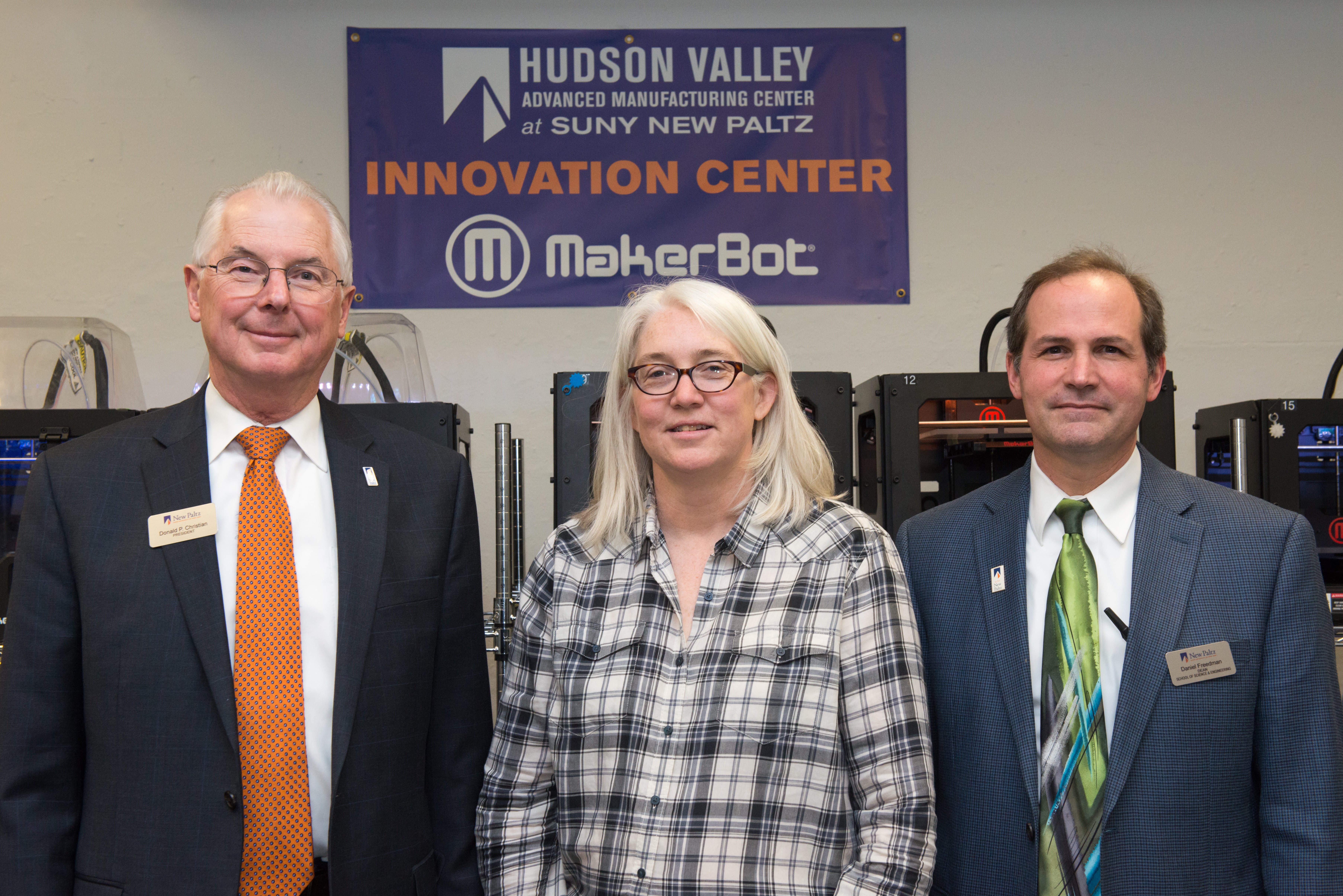SUNY New Paltz announces new 3D printing partnerships with community colleges, hosts MakerBot CEO
On the one-year anniversary of the nation’s first MakerBot Innovation Center at SUNY New Paltz, the College welcomed 3D printing industry leader and MakerBot CEO Jennifer Lawton and announced its plans to purchase MakerBot 3D printers, and provide technical and curriculum support, to community colleges including Ulster, Dutchess, Orange, Sullivan and Columbia-Greene.
“We are so pleased to have the opportunity to link this technology to our friends at the community colleges and continue to serve the region through this initiative,” said New Paltz President Donald P. Christian. “New Paltz is the number one destination for transfer students from most of our nearby community colleges. This expansion ensures that transfer students, particularly in mechanical engineering, gain some of the same exposure to 3D design and printing as students who start their education here at New Paltz.”
The initiative is being funded by a portion of a $1 million economic development grant awarded to the College in December 2013 by the Regional Economic Development Council.
Following the announcement, Lawton presented “12 Years From Now,” a forecast for 3D printing, to a packed house of approximately 300 people from across the Mid-Hudson regional community including students, faculty, staff, industry leaders, and local high school students and educators.
“One of the things I love about 3D printing is once you see a 3D printer work, it changes the way you think about the world, about the way you can make things, about the way things can happen and about the way that you learn,” Lawton said. “As a result of that, I think the next 12 years are really critical. SUNY New Paltz is leading the next industrial revolution by taking a jump ahead and making it so that when those kids come out of high school, they’ve got tools in their higher education system that they can take into the workplace.”
Since launching the Hudson Valley Advanced Manufacturing Center (HVAMC) in spring 2013, the College has expanded its 3D capacity to meet the current and future demand of this burgeoning technology for educational and business use in the region. This includes the Schools of Science and Engineering and Fine and Performing Arts expanding their collaboration to include the Schools of Business and Education.
“Our 3D initiative has accomplished a great deal in a short period of time and with the help of our partners, particularly MakerBot, this effort has anchored us as the premier hub for advanced manufacturing in the Hudson Valley,” said Daniel Freedman, dean of the School of Science and Engineering and director of the HVAMC. “This is a great time to be able to step back and look at everything that we have accomplished in the last year and look forward to a number of innovations on the horizon.”
About New Paltz’s 3D Printing Initiative
Since launching the HVAMC in spring 2013, the College’s effort to fuse learning and manufacturing, science and the arts has continued to gain momentum. In February 2014, the College partnered with Brooklyn, N.Y. – based MakerBot, the leading manufacturer of desktop 3D printers, to open the nation’s first MakerBot Innovation Center at SUNY New Paltz. The 3D Printing Initiative received additional funding in fall 2014, including a $10 million NYSUNY 2020 Challenge Grant to help establish an Engineering Innovation Hub and $850,000 in capital funding for a new 3D printing laboratory. In December 2013, the Mid-Hudson Regional Economic Development Council and Governor Andrew Cuomo awarded the College $1M in state economic development funds. Currently, the HVAMC is providing digital design and fabrication expertise to about 50 businesses and entrepreneurs throughout the region. The Center also engages the local community and educates the public about the possibilities of 3D printing. Workshops for K-12 educators have attracted a wide variety of teachers, from art to science, who have an interest in digital design and fabrication and are utilizing these new technologies in their classrooms.


